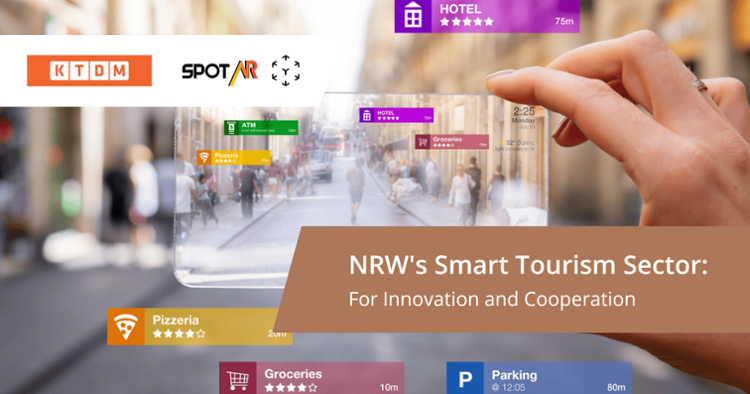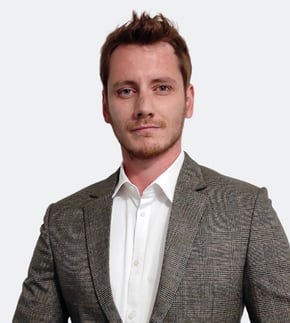The Smart Tourism sector has been in the news quite a lot recently. With cities struggling to maintain tourist numbers due to the pandemic and cost-of-living crisis, it’s clear that something needs to be done. As a key pillar of any city’s economy, tourism is hugely important.
To understand how cities are fighting their way out of this situation, we reached out to a number of experts from Germany’s North-Rhine Westphalia region to find out what challenges cities face, and what solutions are available to help the tourism sector recover.
 iStock: grunwalds, ID: 1288375631
iStock: grunwalds, ID: 1288375631
KTDM Metropole Ruhr UG
With the future of Smart Tourism in question thanks to the effects of the pandemic, we reached out to KTDM Metropole Ruhr UG to learn how cross-industry synergies are key to kickstarting an industry in dire straits. We spoke with KTDM Metropole Ruhr’s Cooperation Manager, Michael Kutz, and Project Manager, Stefan Kitzka, along with rku.it’s Innovation Manager, Sebastian Schmidt, to learn more.
Thank you for joining us! Can you tell me a little bit about KDTM and what you do?
Michael: We specialize in active corp management. That means we bring together stakeholders from business, society, and academia. We have developed a Digital Corporation Portal with another IT company called rku.it for these clients. They can present themselves on the internet and they can present their projects to find cooperation partners, and we help them to manage this cooperation.
Fantastic. So, you’re an active collaboration portal? Is that something like a matchmaking service?
Michael: Absolutely, but matchmaking is only the first step. It is often the case that you build a network and bring people together, but what is the framework behind it? And that's exactly what we do. We try to help different stakeholders work together, across borders, internationally and also in different sectors, with different people with different backgrounds and skillsets. For example, when you bring together people from banks and artists, it's very interesting because they speak the same language, but they don't speak the same language at the same time! So, it is our job to build a bridge.
Smart bridge builder, then? Where exactly are you currently building bridges? Do you have any cities that you're currently active in?
Michael: We have managed a lot of business between Germany, Europe and China, but right now we’re focusing on Europe. Particularly, in the metropolises in Germany, the Ruhr is a perfect example, and the Rhineland too.
One example: with a population of around 5.5 million, the Ruhr region is among the top five in Europe. It is considered the largest city metropolis in Germany. There is an enormous market here, and not just for smart tourism. Economic hotspots are Dortmund, Essen, Bochum and Duisburg with the world's largest inland port. Energy, logistics and services are currently the economic hotspots in the Ruhr region. We advise the Metropole Ruhr and try to network actors also in the Smart City / Smart Tourism area. Next year, we'll start with Hamburg and Berlin. We also plan to move into regions across the border in France.
When it comes to cooperation between stakeholders, what would you say are the main trends that you see for the future? What is the future of the Smart City and how do you fit into it?
Michael: I think in this time it is even more important to come together, to talk to each other, to have a dialogue. And I think that people are more and more able to realise that in the past - I'm only talking about Germans, because I'm German - they often wanted to do everything themselves. But now they see that it is not possible to do everything themselves, especially in the Smart City.
Smart City is so much. What is Smart City? There are so many different things in the Smart City, and if you are an expert in one thing, it doesn't mean you are an expert in ten other things. You need other experts. Nobody does business development all by themselves. You have to talk, you have to be open to collaboration. And that's what we always say. You must have a particular mindset. If you are open to new approaches, and if you are open-minded, you will develop even better than if you are alone.
So, my job - I am a consultant, but my job is that I am a scout. I'm on the lookout for projects and actors. Not everyone who thinks they have a good project or is necessarily a good cooperation partner. Of course, the structures must be there, the know-how, the experience. And you must meet other people as they are. You have your expectations, they have their expectations and there are so many other aspects. It's not a matter of coming together and working together. It's about moving forward, step by step.
So, in summary: the future is cooperation?
Michael: Absolutely!
To find out more about how KTDM is finding the right partnerships to help our cities evolve, take a look at their website for the full story.
spotAR
Tourism is a key pillar of any city’s economy. After the recent COVID-19 pandemic, the tourism sector has been feeling the squeeze. However, there’s often opportunity in crisis situations, and new innovations can be put into the spotlight to help bring value to a troubled industry. SpotAR is one company who is hoping to inject some new life into the tourism sector using augmented reality technology. We spoke to spotAR’s co-founder, Viktor Waal, along with the company’s 3D Artist, Raphael Bernal Tejedor, and Designer and Software Engineer, Johannes Vollmer to learn more about this exciting technology.
Hey guys. First, tell us something about SpotAR. What does your company do?
Viktor: SpotAR has developed a platform called Next Generation City Guides. Our platform enables a digital city tour with augmented reality. This means that tourists can be navigated to exciting sights and places with the help of augmented reality. The platform targets smart tourism, smart destinations, and smart cities. We want to improve the tourist experience and enable a city to create its own tours, using interesting insights and rich visuals to tell the story of the city.
That sounds awesome! Is your platform already being used in cities? If so, which ones?
Viktor: Yes, it is. It already exists in various cities in Germany. Lübeck is one city that already uses our platform. And of course, our hometown of Soest is already using it.
AR seems to be a really hot topic at the moment. How do you think your industry will develop in the future? What would be the best case?
Viktor: When AR glasses are ready for the market, and I think that will be the case in the near future, then a big company like Apple, for example, could be one of the providers of augmented reality glasses and that would be perfect for us.
And why? Because the tourism industry is perfect for such an application. You can use AR for storytelling. So, tourists can navigate their way through the city, and they get information about their city and about important places as they travel. It’s a much more immersive way to explore a city.
Thanks Viktor, Raphael and Johannes for your time.
Would you like to know more about the advantages of Augmented Reality when it comes to immersive Smart Tourism solutions? Head over to spotAR’s website for more information!
Smart Innovation and Cooperation
Whether it’s recession or a global pandemic, smart cities are at the mercy of many difficult challenges. However, after talking with a number of exciting companies from Germany’s NRW region, it’s clear that with an open-mind for cooperation, and the ability to take advantage of new technologies and innovations, it’s possible to find solutions for even the greatest of challenges.
These interviews took place at the Smart City Expo World Congress in Barcelona. The state of North Rhine Westphalia offers companies from NRW the opportunity to present their products and service at the trade fair.

